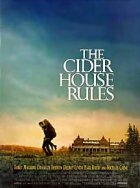| The Cider House
Rules |
| |
 |
USA, 1999. Rated PG-13. 131 minutes.
Cast: Tobey Maguire, Charlize Theron,
Delroy Lindo, Paul Rudd, Michael Caine, Jane Alexander, Kathy Baker, Erykah
Badu, Kieran Culkin, Kate Nelligan, Heavy D, K. Todd Freeman, Paz de la
Huerta, Spencer Diamond, Erik Sullivan
Writer: John Irving based on his novel
Music: Rachel Portman
Cinematographer: Oliver Stapleton
Producer: Richard N. Gladstein
Director: Lasse Hallström
LINKS
|
 t's
difficult to imagine a darker world than the one that Homer Wells (Tobey Maguire)
is heir to in The Cider House Rules. The lifelong resident of a geographically
isolated orphanage in St. Clouds, Maine (itself tucked away in one corner of
the nation), he is surrounded by sorrow. St. Clouds is in the business of dealing
with what must be the most sorrowful event on earth, the appearance of unwanted
life. Run by Dr. Wilbur Larch (Michael Caine), the orphanage also serves as
a medical facility to pregnant women who will not or cannot raise the children
that they carry in their wombs. When born, those unwanted children take up residence
in the orphanage, each awaiting the day when a family will arrive to adopt them.
If that day comes. And for many, it will not. Homer is one of those many, now
grown to adulthood and serving as an apprentice to Dr. Larch. He's a bit like
the house mascot, really... the equivalent of a son to Larch, and the beloved
big brother to the other parentless children. Though Larch serves as a father-figure
to all, Homer is their true keystone. Because he is them, fully grown
without ever having been chosen or wanted. He is proof that sorrow can be survived.
And somehow, their adoration of him may be even more reassuring proof on an
issue that surely haunts their thoughts: is unwanted the same thing as unloved?
If he--arguably the best of the children--was never wanted, perhaps there is
less significance to being passed over than they fear.
t's
difficult to imagine a darker world than the one that Homer Wells (Tobey Maguire)
is heir to in The Cider House Rules. The lifelong resident of a geographically
isolated orphanage in St. Clouds, Maine (itself tucked away in one corner of
the nation), he is surrounded by sorrow. St. Clouds is in the business of dealing
with what must be the most sorrowful event on earth, the appearance of unwanted
life. Run by Dr. Wilbur Larch (Michael Caine), the orphanage also serves as
a medical facility to pregnant women who will not or cannot raise the children
that they carry in their wombs. When born, those unwanted children take up residence
in the orphanage, each awaiting the day when a family will arrive to adopt them.
If that day comes. And for many, it will not. Homer is one of those many, now
grown to adulthood and serving as an apprentice to Dr. Larch. He's a bit like
the house mascot, really... the equivalent of a son to Larch, and the beloved
big brother to the other parentless children. Though Larch serves as a father-figure
to all, Homer is their true keystone. Because he is them, fully grown
without ever having been chosen or wanted. He is proof that sorrow can be survived.
And somehow, their adoration of him may be even more reassuring proof on an
issue that surely haunts their thoughts: is unwanted the same thing as unloved?
If he--arguably the best of the children--was never wanted, perhaps there is
less significance to being passed over than they fear.  Of
course, he also serves as a reminder of a less reassuring fact: as they grow
older, the odds of ever finding a home become miniscule at best.
Of
course, he also serves as a reminder of a less reassuring fact: as they grow
older, the odds of ever finding a home become miniscule at best.
The strangest thing about The Cider House Rules is the way that it frames
this profoundly disturbing world in love and hope and light, allowing the overwhelming
sadness to coexist with a genuine sense of familial solidarity and affection
within the walls of the orphanage. Dr. Larch always sends these kids off to
sleep with the same refrain, "Goodnight, you Princes of Maine... you Kings of
New England", and hokey though it may seem, this affirmation of their existential
importance plays like the deeply necessary sustenance that it is. There is something
magically effective about this portrayal of orphanhood. By avoiding any emphasis
on the trials of brutal institutionalization, the film cuts straight to the
heart of the more important burden carried by these children, which is living
in a state of tangible disconnection and rejection, as if they are--by nature--living
"mistakes" with no proper place in the world. They are loved, and they are wanted
within the orphanage, just as those who are adopted will likely be loved and
wanted within their new families. But none of that acceptance will ever eradicate
the fact that their lives began as a source of grief and inconvenience, or that
those who brought them into the world were capable of letting them go. By portraying
their experience as unmuddied by draconian tortures or chilly treatment by the
staff, this irreparable aspect of their sorrow is given the respect that it
deserves. And though many moments are staged for maximum effect with regard
to eliciting our sympathy, they're not the least bit offensive or cloying. Hallstrom
could have laid it on twice as thick, and I would have been with him all the
way.
In addition to deliveries, Larch performs illegal abortions for those women
who seek them. This is a source of conflict between him and Homer, who cannot
bring himself to believe that aborting the unwanted is a justifiable solution.
And who can blame him? He would not be at all if his own mother had taken
that path. Larch believes that the real world is more complicated than simple
absolutes of right and wrong can adequately address, and thus justifies his
practices as unfortunate necessities in the face of that complexity. They agree
to disagree, and Homer restricts his medical participation to deliveries only.
These issues are introduced and handled with remarkable gracefulness, making
the conflict clear, but never using it as an excuse to stage a big dramatic
scene or to prop up a phony wall between the two characters so that it can later
be dismantled for the satisfaction of the audience. Their disagreement is philosophical
and experiential. Homer's idealism is a function of his youth and his own history.
Dr. Larch's pragmatism is a function of his insistence on seeing the world with
his eyes wide open. But neither position has any bearing on the love and respect
that they feel for one another. Again, a welcome and generous approach. 
As the film progresses, we come to see Homer's growing discomfort. His entire
world is inside of these walls, and the endless cycle of births and abortions
and adoptions and disappointments becomes oppressively constraining. The arrival
of the handsome, unmarried young couple Wally and Candy (Paul Rudd and Charlize
Theron), who are there for an abortion, ignites Homer's desire to explore the
world beyond St. Clouds. When they're preparing to depart, he asks if he can
ride along, though he has no specific destination in mind. Homer's abrupt departure
rattles the residents of St. Clouds, particularly Dr. Larch, who had hoped Homer
would succeed him someday in the "family business." Though saddened by his exit,
the kids and the staff understand his yearning to commence a life beyond his
beginnings, and thus they bid adieu with gracious well-wishes. Most of them,
anyway. A couple of the older kids are too sad or angry to say goodbye at all,
which is a fitting response to the breakup of the only family that they've known.
I've never read the book, but I have to confess that I was disappointed when
the film moved away from the richly integrated world of the orphanage and sent
Homer on his adventures in the real world. Clearly, this adaptation is true
to the general path and intent of the novel (Irving wrote both the screenplay
and the book, so it's safe to say they're in sync), so it's not as legitimate
a complaint as I'd like it to be. Homer needs to experience the world and a
life of his own in order to comprehend the things that Dr. Larch has tried to
explain. But the series of episodes that follow still felt less compelling or
resonant to me, as useful as they are thematically. Homer accompanies Wally
and Candy back to Wally's home, where he joins the picking crew that harvests
the apples that are grown and sold. They're short of workers because of WWII,
and Homer is a welcome and needed addition. When he takes up residence in the
Cider House, a grungy shack of a barracks that serves as living quarters for
the all-black crew, the lead man, Mr. Rose (Delroy Lindo) remarks that they're
"making history", which is no doubt a reference to the fact that he's a white
boy moving in with the disenfranchised "coloreds." This is--of course--no problem
for Homer, whose life is a state of disenfranchisement. He fits right in with
the crew, developing an easy bond with them as both friends and co-workers.
AboutFilm.Com
The Big Picture
|
| Alison |
-
|
| Carlo |
B
|
| Dana |
B
|
| Jeff |
B+
|
| Kris |
B
|
| ratings explained |
In the meantime, Wally resumes his military service in the Air Force, shipping
out and leaving Candy in the capable and affectionate hands of Homer, whose
infatuation with her is just about as hard to spot as the sunrise. They become
fast friends and ultimately lovers, a transition that happens in a can't-stop-themselves
manner that's clearly meant to mock Homer's earlier complaint that abortion
wouldn't be necessary if people would simply maintain reasonable control over
their actions. With all he's seen and known, he's no more capable of overcoming
immediate desire than the average guy. Nor is he--for all of his goodness and
moral rectitude--capable of observing loyalty to his absent friend and benefactor
Wally. He wants Candy, and Candy wants him. And thus commences their reckless
betrayal of other dearly-held values. In time, a situation presents itself that
forces Homer to rethink his rejection of abortion as a solution or strategy,
though it isn't the one you might expect.
The Cider House Rules is a lovely film in many respects. The performances
range from very good (Maguire, Rudd, Jane Alexander, and newcomer Erykah Badu
as the daughter of Mr. Rose) to excellent (Caine, Lindo, Kathy Baker, Charlize
Theron). Its drama is uniformly understated, eliminating the histrionics one
might expect from these events and this subject matter. The children are adorably
soulful, evoking just the right level of heartwrenching empathy. The cinematography
is beautiful, giving this universe a vibrant glow, even in scenes meant to play
as harsh or sad. Rachel Portman's score is gooey and insistent, but not offensively
so. It complements Hallstrom's tone with absolute precision, which means that
it will be embraced or rejected along with the film itself by each individual
viewer. Like so many major releases from this astonishing year, this film is
clearly a labor of love and compassion on the part of all involved. Caine hasn't
been this subtle or powerful in ages. His love for the character surrounds him
like an aura, no doubt generated by his delicate attention to detail in every
moment. Maguire has the right screen presence for Homer, who is a world-weary
naif, as oxymoronic as that characterization may seem. The role gives him less
to do than most leading parts, however, because the context of his experience
is largely the drama of others, which he observes and grows from. Still, his
soulful gaze is an asset that Homer would likely be too dull without, making
Maguire's presence a boon beyond the particulars of his performance.
I wish I could have embraced the whole as effortlessly as I embraced the first
half, but something about the meanderingly mechanical events in the "real world"
left me disengaged. While the central themes of disenfranchisement, human complexity
and moral ambiguity are effectively rendered in several good scenes, there's
too much sense of the necessary elements being introduced and played out in
order to reach the pre-ordained conclusion. The events in the first half are
probably no less mechanical, but they flow and evolve as if they are the natural
state of things, as opposed to plot points in a movie with an agenda that must
be met. I would have been happy to spend the full running time behind the walls
of St. Clouds, getting to know those Princes of Maine/Kings of New England and
their loving custodians in greater detail. Of course, that would not have been
The Cider House Rules at all. For better and for worse, this film tells
its intended tale about as well as it could be told, and with a sweetness and
generosity of spirit that is undeniable and admirable. Anyone with a reasonable
tolerance for artfully rendered sentiment and philosophical contemplation will
find more to like than not.
Review
© December 1999 by AboutFilm.Com and the author.
Images © 1999 Miramax. All rights reserved.

 Of
course, he also serves as a reminder of a less reassuring fact: as they grow
older, the odds of ever finding a home become miniscule at best.
Of
course, he also serves as a reminder of a less reassuring fact: as they grow
older, the odds of ever finding a home become miniscule at best. 
